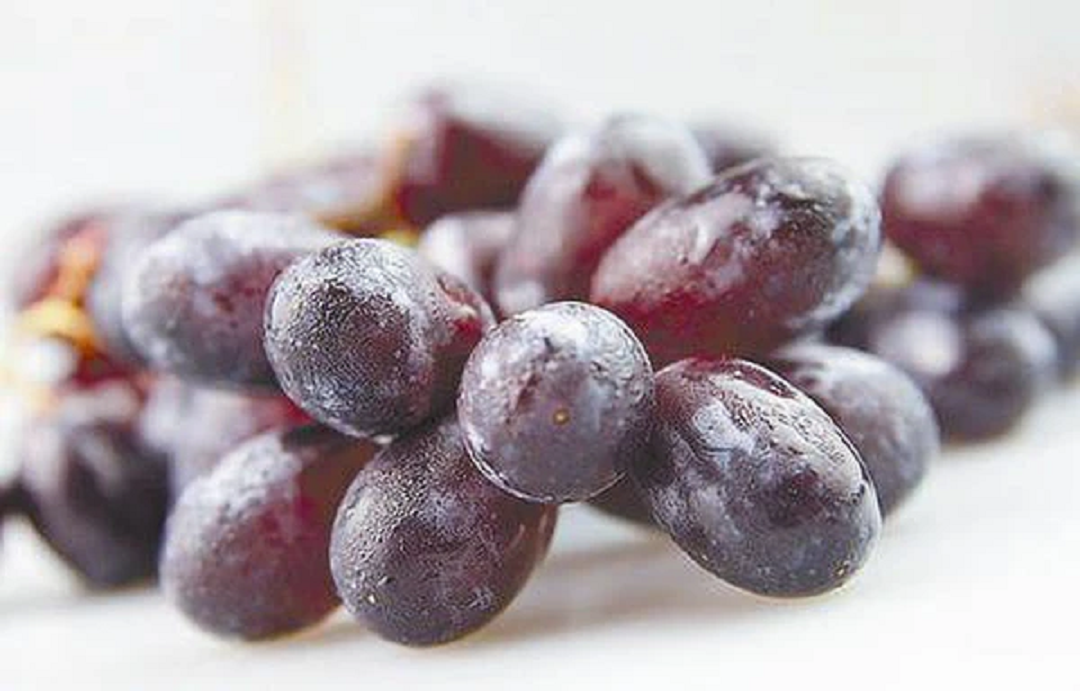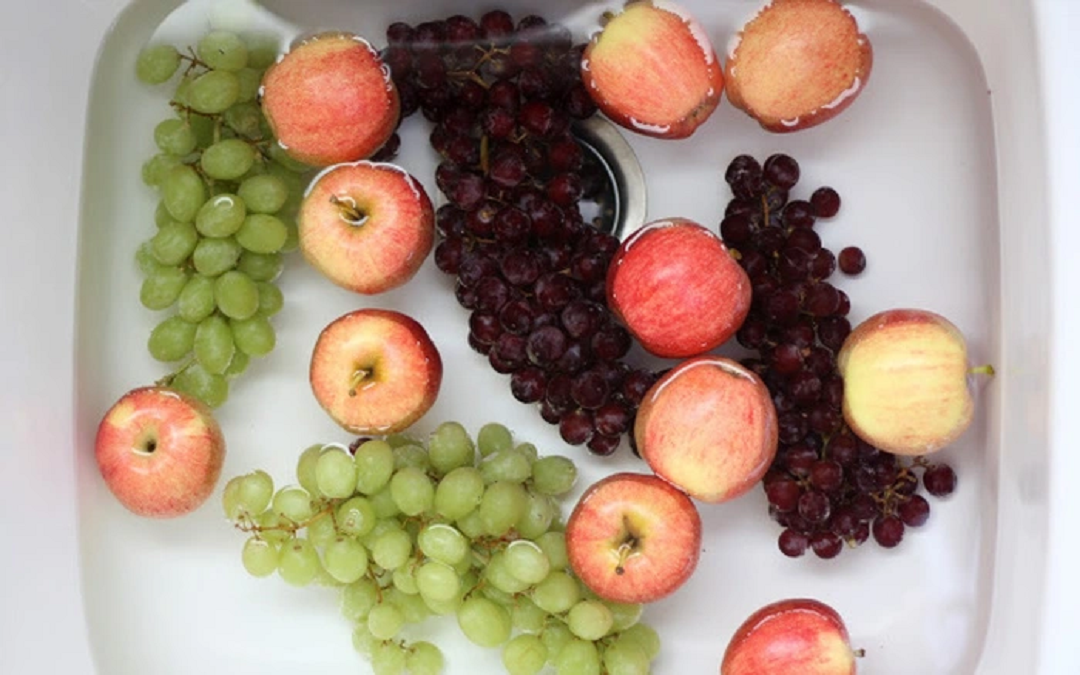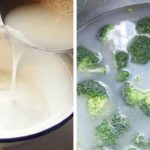Apples
A recent study found that lead levels in apple peels have increased significantly. Another study showed that the content of other heavy metals such as lead, cadmium, copper, tin, and thallium in apple peels was several times higher than that in the fruit’s flesh.
However, these studies suggest that apple peels directly absorb lead from the air, and if protected in a bag, this level can be reduced by up to 80%, making apple peels safe for consumption.
Tips for Eating Apples with the Peel
– Choose apples that are packaged or bagged. The peels of these apples are cleaner and less affected by air pollution, pesticides, and preservatives.
– Autumn is the safest season to consume apples as it is the season when apples are less likely to be treated with preservatives.
– Fresh apples have a natural waxy coating (if the apple peel is shiny, it should be peeled before eating).
– Apples can be peeled and then soaked in salted water to prevent discoloration.
Pears
Pesticides are substances used to combat, prevent, or destroy pests and are widely used on fruit and vegetable crops around the world. The consumption of fruits and vegetables grown with high levels of pesticides is a concern as it can affect both acute and chronic health issues.
When shopping, be wary of fruits that are overly plump, bloated, or “too perfect” compared to their natural state; check if the color is true to its natural shade, and look for any signs of wilting or discoloration. Fruits with abnormal colors, such as green or dark green, may be due to nitrate (NO3) contamination…

Grapes have a delicious flavor, but many people avoid eating them due to the excessive use of chemicals. Illustration.
Grapes
Grapes are a popular fruit, loved by many, especially children. They are highly nutritious, containing significant amounts of minerals such as calcium, potassium, phosphorus, iron, and protein, as well as various B-group vitamins like B1, B2, B6, and C, along with essential amino acids for the human body.
Due to their excellent nutritional value, grapes can be processed into grape juice, raisins, wine, fresh grapes, or used in salads. Notably, grapes are also a rich source of vitamin K, a fat-soluble vitamin crucial for blood clotting and healthy bones.
According to Phụ Nữ Việt Nam, despite their benefits, grapes are also one of the fruits with high levels of pesticide residue. This is due to the grapevines’ susceptibility to pest infections. Data from the US Department of Agriculture (USDA) shows that out of 46 tested fruits and vegetables on the market, grapes tested positive for multiple pesticides, including insecticides and fungicides, ranking among the top fruits with residues of two or more types of pesticides.
Dr. Leonardo Trasande, head of environmental pediatrics at NYU Langone (USA), states that exposure to multiple pesticides, even at low levels, can have numerous impacts on human health. Studies indicate that pesticides can affect the nervous system, cause eye and skin irritation, interfere with the body’s endocrine system, or lead to cancer. Particularly, infants and children are highly vulnerable to the effects of pesticides, as the chemicals can harm their developing brains.
A 2020 study found an increased risk of reduced IQ and intellectual disabilities in children due to exposure to organophosphates – a common type of pesticide. A high number of pesticides also affect the endocrine system from the fetal stage, potentially hindering development, reproduction, and metabolism.
Effective Tips to Remove Pesticides from Fruits
Associate Professor Dr. Nguyen Duy Thinh, former lecturer at the Institute of Technology and Food – Hanoi University of Science and Technology, shared with Kinh tế & Đô thị that vegetables and fruits contaminated with pesticides have become very common. This is due to farmers’ use of pesticides to combat crop infections, inadequate post-harvest waiting periods, and the persistence of pesticide residues on produce.
Notably, Dr. Thinh points out that even stores claiming to sell safe vegetables may not be entirely trustworthy. They might also be sourcing their produce from the same markets, without proper analysis or certification of the region’s safe agricultural practices. Therefore, the best course of action for consumers is always to take matters into their own hands and process their fruits and vegetables to reduce the presence of any potential pesticide residues.

Rinse fruits before consuming to eliminate pesticide residues. Illustration.
Effective Fruit Washing Techniques
The fundamental principle is to wash fruits and vegetables thoroughly with ample water. Don’t assume that produce appears clean (free of dirt or mud) and is, therefore, safe to eat. Multiple rinses are necessary. For fruits and vegetables, the only effective method for ensuring cleanliness is to wash them thoroughly. Firstly, discard any damaged or bruised produce, as chemicals can infiltrate these compromised areas more rapidly than intact cells.
1. Soak the fruits and vegetables in clean water for about 5-10 minutes before rinsing or use rice washing water to neutralize the toxins in the pesticides.
2. Wash the produce with a 5% salt solution. If you don’t want to alter the flavor of your food, you can opt for a more familiar soaking method using diluted salt water. Soaking fruits and vegetables in a mild salt solution for about 20 minutes can help eliminate up to four common types of pesticides: chlorpyrifos, DDT, cypermethrin, and chlorothalonil.
3. For certain fruits with high pesticide concentrations, it is best to thoroughly wash and then peel them before consumption.
4. Soaking fruits and vegetables with vinegar is one of the most effective methods for eliminating bacteria and pesticides. Vinegar exhibits strong antibacterial properties. To apply this method, dilute 10% white vinegar with 90% water and soak your produce in this solution for about 10 minutes. During this time, agitate the fruits and vegetables in the mixture to ensure even coverage. Finally, rinse them once with boiled and cooled water.
5. Soaking fruits with baking soda is an excellent method for naturally and effectively removing pesticide residues from fruits and vegetables. Notably, scientists from the University of Massachusetts conducted a study comparing the effectiveness of washing apples with baking soda and water versus a standard cleaning solution. The results showed that soaking apples in a baking soda solution for about two minutes effectively removed pesticide residues.
|
According to Sức khỏe & Đời sống, experts in plant protection assert that pesticide residues in food can enter the body through ingestion. While some of these toxins may be expelled through breathing or excretion, it is inevitable that harmful substances will accumulate in the liver. Some plant protection chemicals metabolize into less toxic products that are more water-soluble and can be eliminated more easily. However, certain chemicals can transform into intermediates that are more toxic (such as paration converting into paraoxon), accumulating in specific organs or fatty tissues and causing harm, along with dangerous symptoms of poisoning. If plant protection chemicals are present in food or beverages in large quantities, they can lead to acute poisoning, causing digestive disorders (vomiting, diarrhea), nervous system disturbances (headaches, coma, convulsions, or muscle rigidity…), cardiovascular collapse, respiratory failure, and even death. Cases of chronic poisoning due to long-term, low-level exposure to plant protection chemicals or their residues in food can also result in damage to the digestive, respiratory, cardiovascular, and nervous systems, along with disorders in the hematopoietic system and adverse effects on liver and kidney function. |
According to Người đưa tin
Choosing Pesticide-Free Apples: Tips and Tricks
Want to make sure your apples are pesticide-free? We’ve got you covered! We will guide you through a simple way to select apples that are not only healthy but also free of potentially harmful pesticides. Start making the smartest choices for you and your loved ones today!
Comparing Benefits of Fresh and Dried Grapes
Which is better for your family’s health, fresh grapes or raisins? Vietnamese families often have a love for both of these snacks, both of them providing a good source of various vitamins and minerals. Let’s explore the benefits of fresh grapes and raisins and see which one has the most nutritional value.






































